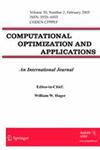Distribution-free algorithms for predictive stochastic programming in the presence of streaming data
IF 1.6
2区 数学
Q2 MATHEMATICS, APPLIED
引用次数: 0
Abstract
Abstract This paper studies a fusion of concepts from stochastic programming and non-parametric statistical learning in which data is available in the form of covariates interpreted as predictors and responses. Such models are designed to impart greater agility, allowing decisions under uncertainty to adapt to the knowledge of predictors (leading indicators). This paper studies two classes of methods for such joint prediction-optimization models. One of the methods may be classified as a first-order method, whereas the other studies piecewise linear approximations. Both of these methods are based on coupling non-parametric estimation for predictive purposes, and optimization for decision-making within one unified framework. In addition, our study incorporates several non-parametric estimation schemes, including k nearest neighbors ( k NN) and other standard kernel estimators. Our computational results demonstrate that the new algorithms proposed in this paper outperform traditional approaches which were not designed for streaming data applications requiring simultaneous estimation and optimization as important design features for such algorithms. For instance, coupling k NN with Stochastic Decomposition (SD) turns out to be over 40 times faster than an online version of Benders Decomposition while finding decisions of similar quality. Such computational results motivate a paradigm shift in optimization algorithms that are intended for modern streaming applications.

流数据存在下预测随机规划的无分布算法
摘要本文研究了随机规划和非参数统计学习概念的融合,其中数据以协变量的形式解释为预测因子和响应。这样的模型旨在赋予更大的灵活性,允许在不确定情况下的决策适应预测者(领先指标)的知识。本文研究了这类联合预测优化模型的两类方法。其中一种方法可归为一阶方法,而另一种方法研究的是分段线性逼近。这两种方法都是基于耦合非参数估计进行预测,并在一个统一的框架内进行决策优化。此外,我们的研究结合了几种非参数估计方案,包括k近邻(k NN)和其他标准核估计器。我们的计算结果表明,本文提出的新算法优于传统方法,这些方法不是为流数据应用而设计的,需要同时估计和优化作为此类算法的重要设计特征。例如,在寻找类似质量的决策时,将k神经网络与随机分解(SD)相结合的速度比在线版本的Benders Decomposition快40倍以上。这样的计算结果激发了用于现代流媒体应用的优化算法的范式转变。
本文章由计算机程序翻译,如有差异,请以英文原文为准。
求助全文
约1分钟内获得全文
求助全文
来源期刊
CiteScore
3.70
自引率
9.10%
发文量
91
审稿时长
10 months
期刊介绍:
Computational Optimization and Applications is a peer reviewed journal that is committed to timely publication of research and tutorial papers on the analysis and development of computational algorithms and modeling technology for optimization. Algorithms either for general classes of optimization problems or for more specific applied problems are of interest. Stochastic algorithms as well as deterministic algorithms will be considered. Papers that can provide both theoretical analysis, along with carefully designed computational experiments, are particularly welcome.
Topics of interest include, but are not limited to the following:
Large Scale Optimization,
Unconstrained Optimization,
Linear Programming,
Quadratic Programming Complementarity Problems, and Variational Inequalities,
Constrained Optimization,
Nondifferentiable Optimization,
Integer Programming,
Combinatorial Optimization,
Stochastic Optimization,
Multiobjective Optimization,
Network Optimization,
Complexity Theory,
Approximations and Error Analysis,
Parametric Programming and Sensitivity Analysis,
Parallel Computing, Distributed Computing, and Vector Processing,
Software, Benchmarks, Numerical Experimentation and Comparisons,
Modelling Languages and Systems for Optimization,
Automatic Differentiation,
Applications in Engineering, Finance, Optimal Control, Optimal Design, Operations Research,
Transportation, Economics, Communications, Manufacturing, and Management Science.

 求助内容:
求助内容: 应助结果提醒方式:
应助结果提醒方式:


